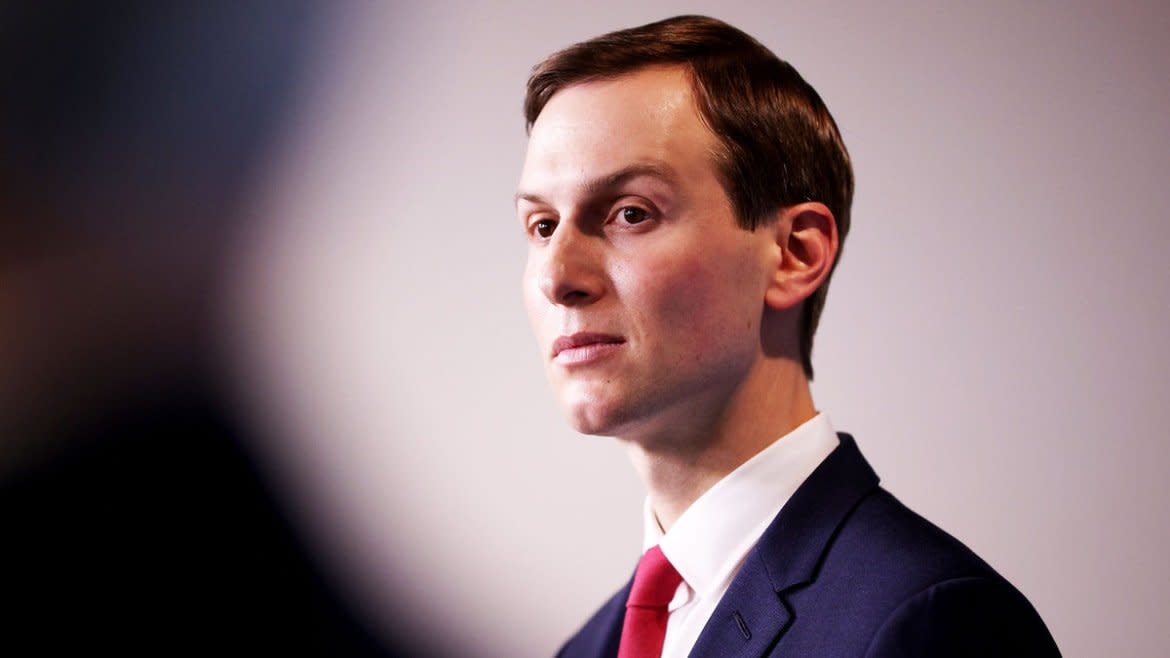Kushner Details His Wild Idea to Use Russia’s Secret Comms

The president’s son-in-law and top aide, Jared Kushner, suggested having Trump’s future national security adviser use secure communications at the Russian embassy to communicate with Russian generals, according to newly released transcripts from the House Intelligence Committee.
The suggestion, made during a December 2016 meeting with Michael Flynn and then-Russian Ambassador Sergei Kislyak, was ultimately nixed by the Russian ambassador, according to Kushner.
Kushner’s proposed back-channel with the Kremlin has been widely reported, but this is the first detailed, on-the-record account by him of the incident. The Washington Post reported in May 2017 that Kislyak relayed the proposal to his superiors in Moscow at the time.
Kushner framed the proposal as an innocuous way to develop closer cooperation with Russia in Syria, saying the Russian ambassador had lamented to him shortly after Trump’s 2016 electoral win that the Russians believed “America’s strategy in Syria was a little bit misguided.”
During a meeting with Flynn and Kislyak, Kushner said, the ambassador “suggested that—that—that there—that they would like to give us, you know, their military's perspective on it, asked if there was a secure way to do so.”
Knowing there was no secure line in the transition office in New York, he said, “I said, look, can we use your communication? … He said, no, we shouldn't do that.”
“Then we moved on and decided that if there was not a way that they were comfortable relaying to us that information, then we'd wait until after we were—after inauguration and do it through the normal course,” Kushner said.
“He had information he wanted to give us. They couldn't find a way to get that information. I suggested an idea, which we all then concluded was not a good idea. There's nothing wrong with giving an idea that is wrong, because, you know, if you do something that's wrong, then that's something that you have to look at,” he said.
Kushner claimed there was nothing nefarious about his proposal. He was merely being a “business guy,” he told investigators. “I wasn't proposing it one way or the other. I was — we were — you know, what you do in meetings when you're trying to solve a problem is you brainstorm situations, so people throw out different ideas.”
Asked who the Trump team wanted to prevent from hearing the communications, he shrugged off a suggestion that it could have been the U.S. administration.
“It could have been to keep it from the Chinese. It could have been to keep it from anyone else who listens to the calls,” he said. Kushner added he had no evidence to support such a supposition.
He denied that the proposal was intended to allow “nefarious hidden conversations” and claimed he’d only suggested using a Russian facility for the communications because he knew of no other way.
“I assume that, if we had a way—if we had something that was available to us that General Flynn knew of, he would have said: Well, I have this suggestion for something that’s available to us that I know of to be able to get the information. Since he didn't have a way to get the information that he knew of, I wasn't going to ask the Russian Ambassador if he knew of anything in our government that was appropriate for him to transmit the information to.”
A 2015 agreement between Moscow and Washington did establish a communication channel —the so-called “deconfliction channel”—between the two sides on the ground in Syria, however, a fact which it seems Flynn should have been aware of at the time.
Kushner’s outreach to Russian officials also apparently did not end with his proposed back-channel. According to the transcripts, he also met with the chairman of a U.S.-sanctioned Russian bank at Kislyak’s initiative in December 2016.
“I mean, it's funny, people asked me after, they said, did you know his bank was under sanctions?” Kushner told investigators of his meeting with Sergey Gorkov of Vnesheconombank.
Kislyak had promised that Gorkov could provide “much more insight into what Putin's thoughts were on a potential new relationship,” Kushner said.
He said the topic of U.S. sanctions never came up, and that after talking to Gorkov, “you would have thought his bank was the best bank in the world.”
“So he was clearly selling what a great job they were doing. And I think he mentioned that they financed the Olympics, and that was really the extent of it.”
Flynn, who President Trump on Thursday praised as a “warrior,” baffled some Pentagon officials during his brief reign as national security adviser with his push to expand military communications with Russia in Syria. As The Daily Beast previously reported, Flynn raised eyebrows among some officials with a proposal to team up with Russia in Syria in a way that would actually likely violate defense provisions that bar such close cooperation.
The transcripts detailing Kusher’s own admissions on the proposed backchannel were released on the same day the Department of Justice sparked outrage by moving to drop the case against Flynn
While both Kushner and the White House have downplayed the significance of the 2016 back-channel proposal with Russia, it was not the only time that Team Trump tried to bypass traditional communication channels for interactions with Russian officials.
Trumpworld insider and Blackwater founder Erik Prince similarly tried to set up an alternate channel during an early 2017 meeting with the head of Russia’s sovereign wealth fund. Prince claimed that the two just happened to meet, one of several patently untrue statements about the get-together. The House Intelligence Committee referred Prince to the Justice Department for potential criminal prosecution last year.
Kushner, for his part, told the committee he had “no knowledge” of any such meetings.
-- Noah Shachtman contributed reporting
Get our top stories in your inbox every day. Sign up now!
Daily Beast Membership: Beast Inside goes deeper on the stories that matter to you. Learn more.

